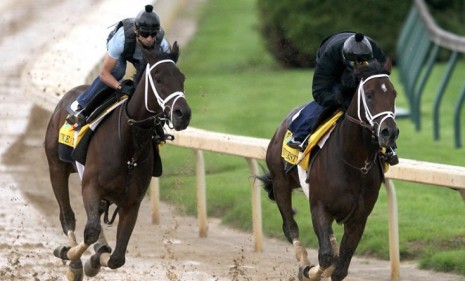The slowest Kentucky Derby field in 20 years: 5 theories
Horseracing insiders are wringing their hands over this year's mediocre ponies. What's to blame for this slow-hoofed crew?

A free daily email with the biggest news stories of the day – and the best features from TheWeek.com
You are now subscribed
Your newsletter sign-up was successful
The Kentucky Derby is this weekend, so get ready for some fast horses... or not. "The field for Saturday's Kentucky Derby could be the worst in decades," says Andrew Beyer in The Washington Post, referencing his decades-old, widely used rating system of thoroughbreds known as the Beyer Speed Figure. "The slowness of this year's field is unprecedented." Why are America's race horses growing relatively sluggish? Here, five theories:
1. The fastest horses have gone abroad
"Part of the explanation for the decline in U.S. thoroughbreds is the exodus of well-bred horses to other countries," says Beyer. Arab and British buyers have been snapping up America's best yearlings (horses between 1 and 2 years old) at auction for years. Japan "remade its entire thoroughbred industry" by purchasing the 1989 Kentucky Derby winner Sunday Silence for breeding. That horse became one of Japan's leading sires, with his progeny going on to become some of the top horses in Asia. "You can't replace class. It has been leaving America and spreading around the world," says breeding expert Bill Oppenheim.
The Week
Escape your echo chamber. Get the facts behind the news, plus analysis from multiple perspectives.

Sign up for The Week's Free Newsletters
From our morning news briefing to a weekly Good News Newsletter, get the best of The Week delivered directly to your inbox.
From our morning news briefing to a weekly Good News Newsletter, get the best of The Week delivered directly to your inbox.
2. Medications are enfeebling our horses
America's horses have grown increasingly fragile in recent decades, and are consequently raced less often — 6.1 races a year on average, compared to 11.3 in 1960. Some blame the prevalence of medicating in American racing, something most other countries ban. "We're the only nation on the planet that allows this stuff," says breeder Arthur Hancock, as quoted in The Washington Post. "I think these medications are weakening the breed."
3. It's just a bad year
Don't rush to blame medicine, poor training, or bad horsemanship, says Len Friedman, the head of the handicapping tool The Sheets, as quoted by Kentucky Confidential. "If you go back 15, 25 years, there were plenty years like this." Future fields could be as speedy as ever.
A free daily email with the biggest news stories of the day – and the best features from TheWeek.com
4. The speed ratings aren't always accurate
The Derby's 20 horses' ratings (based on past performances) are poor, but such calculations don't always reliably predict a horse's success, says Friedman. Before the legendary Secretariat won The Kentucky Derby — not to mention the Triple Crown — he was "shockingly defeated" in a prep race and saddled with a "lowly" rating as a result.
5. We don't breed horses to run the Derby anymore
At one and a quarter miles, the Kentucky Derby is a "demanding distance," says Beyer. "Relatively few horses today" are being bred to run it. And only 3-year-old horses compete. In other categories, and at other distances, some American horses, like the recently retired Rachel Alexandra and Zenyatta — "two of the greatest female horses of all time" — have excelled.
-
 The environmental cost of GLP-1s
The environmental cost of GLP-1sThe explainer Producing the drugs is a dirty process
-
 Greenland’s capital becomes ground zero for the country’s diplomatic straits
Greenland’s capital becomes ground zero for the country’s diplomatic straitsIN THE SPOTLIGHT A flurry of new consular activity in Nuuk shows how important Greenland has become to Europeans’ anxiety about American imperialism
-
 ‘This is something that happens all too often’
‘This is something that happens all too often’Instant Opinion Opinion, comment and editorials of the day